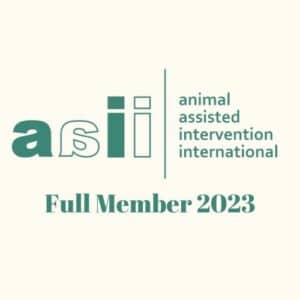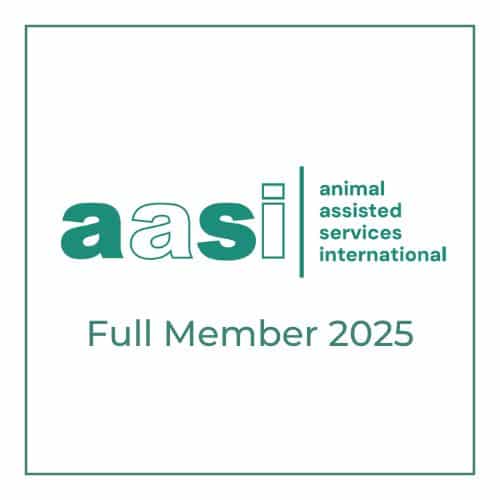
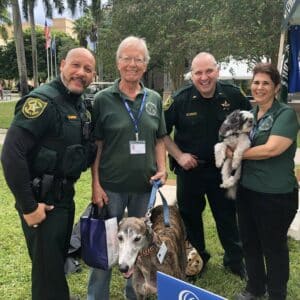
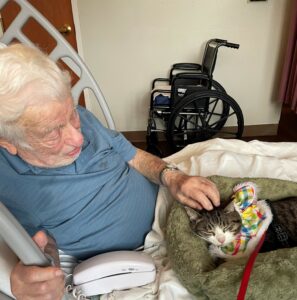
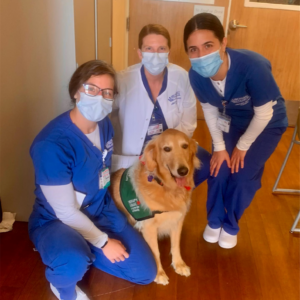
The AAT
Mission Statement
Care, comfort, joy and resilience. The purpose of the HSBC Animal Assisted Therapy Program is to build a humane community while providing unconditional love, embracing the human-animal bond and establishing healing connections.
Animal Assisted Therapy (AAT) is a branch off the tree of Animal Assisted Services (AAS). Animal Assisted Services (formerly known as Animal Assisted Interventions) include activities that utilize animals to benefit humans. This includes animal assisted activities (aka “pet therapy”), animal assisted therapy, animal assisted education, and more.
The Humane Society of Broward County’s Animal Assisted Therapy (AAT) program uses volunteers and their companion animals to provide comfort to children and adults with special needs or those experiencing life’s stresses.
Animals provide people with unconditional love and non-judgmental acceptance and companionship. They serve as catalysts for social interaction and as bridges to interpersonal communication and attachment. We utilize the human-animal bond to help improve health and quality of life for others. It’s no wonder people love their pets so much!
*A therapy pet is not a service animal. Please check out our information page on the differences between a Service, Therapy, and Emotional Support Dog.
*We do not use adoptable homeless animals in our AAT program. Eligible pets must be owned by the potential volunteer and meet the program criteria.
The use of animal therapy to assist people with special needs is not a new concept. There is increasing evidence and statistics that show that the emotional and psychological benefits of pet companionship have physiological counterparts as well. Pets improve not only the intangible “quality of life” but also improve human health.
There have been many studies documenting that petting and caring for animals, particularly those with whom a bonded relationship has been established, can reduce blood pressure, slow heart rate, and improve survival rates from heart disease. The presence of an animal also triggers the brain’s neurotransmitters to release our “happy hormones” (oxytocin, serotonin, and endorphins) and reduce levels of our stress hormones (cortisol and adrenaline). This release of our happy hormones positively effects our mood, social interactions, and feelings of pain.
Animal Assisted Therapy is being used in a wide variety of settings to help people with acute and chronic illnesses. In the hospital, we visit various floors to bring the joy of our pets to those who are ill or recovering. The AAT teams visit the patients’ rooms and help to reduce the stress and anxiety of the children. Many times when the children need to have blood drawn, the dogs are right there beside them so they can pet the dog and have a distraction while their blood is being taken. The interactions between the dogs and the patients are remarkable.
Janice Zack, Certified Child Life Specialist says, “We see this time and time again with the patients. Pets reduce stress, lift spirits, and promote healing in a comforting way.” Our volunteers and companion animals visit their assigned senior facility and give those residents and patients an opportunity to pet the animal, socialize with one another and tell loving stories about their beloved animal friends. AAT visits can be as basic as “meet and greet” or as structured as working on specific goals with individuals under the supervision of a trained staff member.
The type of visit depends on the need of the facility. Additionally, our AAT teams and their therapy animals educate the children in our community on pet safety and how to prevent a dog bite, how to properly care for a pet, why it’s so important to spay and neuter your pet amongst other topics.
It’s critically important to ensure that each child and adult we meet with our therapy animals learn how to be safe around animals and then help us to spread the word to others on pet safety. Each therapy team is carefully evaluated prior to certification and receives specialized training prior to placement in the program. The Animal Assisted Therapy Program (AAT) is a rewarding experience for you and your companion animal.
Our program, originally established to serve elderly nursing home residents in Broward County, has expanded to benefit diverse populations across Broward, Dade, and Palm Beach counties. We now provide animal-assisted therapy to a wide range of facilities, as seen below. Additionally, we offer the Wags & Tales Reading program, where children who struggle with reading can practice by reading to certified therapy and education dogs.
Through this program, our AAT teams visit various facilities with their pets. Below are some of the types of facilities we visit:
- Psychiatric
- Facilities
- Nursing
- Homes (short & long term care)
- Assisted Living Facilities
- Rehabilitation Centers
- Adult Day Care Centers
- Retirement Homes
- Skilled Nursing Facilities / Homes
- Hospitals
- Hospice
- Alzheimer’s & Dementia Facilities
- Residential Senior Groups
- Memory Support Centers
- Mental Health Facilities
- Children’s Long Term Care Facilities Pediatric In-patient & Intensive Care Units
- Eating Disorder Clinics
- Fire and Police Stations
- Developmental Pre-schools (children with multiple and severe disabilities)
- Libraries, Private and Public Schools
***We do not offer pet therapy visits to private residences at this time.***
For Animals:
- Animals must be one year or older to participate
- Animals must be spayed or neutered
- Animals must be well-behaved and have mastered their basic obedience cues, including but is not limited to sit, down, stay, come, leave it, heel, and loose leash walking.
- Animals must be in good health and have up to date rabies and vaccinations. Proof of current health certificate from your veterinarian is required prior to evaulation.
- Animals must be 100% potty trained
- Animals must be non-aggressive in all situations towards humans and other animals
- Animals must be interested in meeting new people
- Animals should have no history of aggression, including lunging, biting, growling, or seriously injuring either a person, child or another animal
- Animal should be trained utilizing Positive Reinforcement and Fear Free methods
- As of January 1, 2024, dogs are required to have passed the American Kennel Club Canine Good Citizen Test (CGC). A certified dog trainer must administer this. Or all CGC areas will be tested and must be passed during a Therapy Evaluation.
- All dogs must be heartworm negative. If a dog had heartworm, they must have had a negative result during their 6 month post treatment recheck before being evaluated.
For Handlers:
- Handlers must be 18 years or older
- Handlers must have owned their animal for a minimum of 6 months
- Handlers must be able to read their animal’s particular stress signals
- Handlers must be able to anticipate their animal’s responses, behavior and body language
- Handlers must advocate for the safety and well-being of their animal at all times
- Handlers must be able to communicate with their animal in a positive way , that does not include any kind of negative punishment
- Handlers may not use choke chains, prong collars, shock collars or any type of negative punishment equipment when working with their animal
- Handlers must represent themselves in a professional manner at all times while representing the Humane Society of Broward County
Eligible Species:
There are many species that make wonderful therapy animals. Currently, we accept the following animal species in our AAT Program:
- Dogs
- Cats
- Ferrets
- Guinea Pigs
- Rabbits
- Pot-bellied Pig
- Equines
- Llamas & Alpacas
Therapy pets are more than just our average friendly four-legged friend. Please consider the following questions to see if AAT work would be something you AND your pet would enjoy.
Your pet:
- How does your pet respond to new people?
- How does your pet respond to being petted by strangers?
- How does your pet respond to being hugged by strangers?
- How does your pet respond to being groomed/bathed?
- Does your pet stay unstressed while moving through groups of people?
- How do your pets respond to other animals?
- How does your pet respond to new environments?
- How does your pet respond to unusual equipment (large trucks, mobility equipment, etc.)?
- How does your pet respond to unusual noises (beeps, loud noise, etc.)?
- How does your pet respond to meeting strangers under the age of 10?
- How does your pet respond to meeting strangers over the age of 70?
- How does your pet respond to meeting strangers of different genders?
- How does your pet respond to meeting strangers of different racial backgrounds?
- How does your pet respond to meeting strangers in uniform (scrubs, police, firefighters, etc.)?
- How does your pet respond to strangers with varying abilities (mobility issues, Autism Spectrum Disorder, etc.)?
For dogs only:
- Does your dog follow the sit cue consistently, occasionally, or rarely?
- Does your dog follow the down cue consistently, occasionally, or rarely?
- Does your dog follow the stay cue consistently, occasionally, or rarely?
- Does your dog follow the heel cue consistently, occasionally, or rarely?
- Does your dog follow the leave it cue consistently, occasionally, or rarely?
- Does your dog follow cues for sitting with distractions?
- Does your dog follow cues for down with distractions?
- Does your dog follow cues for stay with distractions?
- Does your dog follow cues for heel with distractions?
- Does my dog walk nicely on leash (loose leash walking)?
For cats only:
- Does your cat walk on a harness?
- Does your cat follow cues for stay?
- How does your cat do in a carrier?
- How does your cat respond to handling (i.e. picked up and moved)?
You:
- How comfortable are you talking to strangers?
- How comfortable are you going into new environments?
- Can you commit to at least 2 hours a month of volunteering?
How to become a Certified AAT Team with the Humane Society of Broward County
Attend a dual in-person orientation that covers both the general volunteer and AAT programs on select Saturdays. This orientation is for humans only. You don’t need to sign up for the HSBC Volunteer Orientation separately if you choose this option. This orientation takes place at the shelter, 2070 Griffin Road, Fort Lauderdale, FL 33312.
We do request a $30 deposit to sign up for an AAT orientation. This will be used towards the program fee should you pass the evaluation. If you do not pass the evaluation or communicate that you have chosen not to move forward, this deposit will be refunded. If you do not show up to the orientation and provide no prior notice, this deposit will be not be refunded and considered a donation to the shelter.
Click the following link to sign up for an upcoming AAT Orientation.
If you have any questions regarding the orientation please contact therapy@hsbroward.com
After orientation if you are ready to move forward, you will work with the AAT Program Manager to be scheduled for your evaluation. The evaluation will take approximately 1 hour.
Evaluations are conducted at the Humane Society of Broward County.
The evaluation process and expectations will be thoroughly discussed during orientation. Your pet will be expected to perform species appropriate basic and advanced commands listed in the program criteria section above.
If you and your pet pass the therapy evaluation, you will be required to complete an authorization form allowing the HSBC to perform a multi-state criminal background check and pass prior to acceptance in the program. The cost is $30.00 (non-refundable).
If you pass the background check, the Program fee is $120 per team. This fee covers program materials, an AAT shirt, therapy pet’s vest, evaluation, and liability insurance coverage. The Program fee is a one-time, non-refundable charge.
Once onboarded into the HSBC Therapy Program, you will be matched with mentor volunteers to shadow at various facilities in the community until you are comfortable to start visiting an assigned facility on your own. We also offer opportunities for teams to work together at group events.
After you complete your shadowing, you and your pet are ready to bring love and joy to everyone you meet!
Every two years volunteers must submit to a multi-state criminal background check and the team will be re-evaluated to ensure the pet is continuing to enjoy therapy work and working with certain populations. The cost of the background check will be at the volunteer’s expense.
Become a Volunteer
Join the largest pet therapy program in South Florida and become a volunteer.
AAT Videos & Photos
Take a look at our Animal Assisted therapy safety videos and photos from our Youtube channel.
AAT Brochure
Check out the Animal Assisted Therapy brochure for more information on program criteria.
Register Your Facility
Volunteers and their therapy animals offer in-person and virtual teletherapy appointments.
Register Your Event
Host an event that includes therapy pets! Reduce stress and increase quality of life with some unconditional love from our therapy animals!
Wags & Tales
HSBC is uniquely positioned to offer AAT dogs as non-critical listeners as an alternative to class reading groups.
Crisis Dog Teams
Support Paws dogs are trained to participate in traumatic situations. Find out more.
Education Dogs
In addition or instead of therapy work, some dogs are perfect for Education! Education Dogs work in the community to teach children about pet safety, help children work on reading in Wags & Tales, and so much more.
If you are interested in joining our AAT program? First step is to attend an orientation. Please fill out the following form if you are interested in attending an AAT orientation. AAT Orientation Form
If AAT is not a good fit for you and your dog, but your dog loves kids and you would love to share your well behaved pup with the community, there’s another opportunity that might be just for you! You could become an Education Volunteer and get your pet certified as an Education Dog. Click here to learn more.
Questions? Contact the Humane Society directly at 954.266.6875 or email us at therapy@hsbroward.com.
